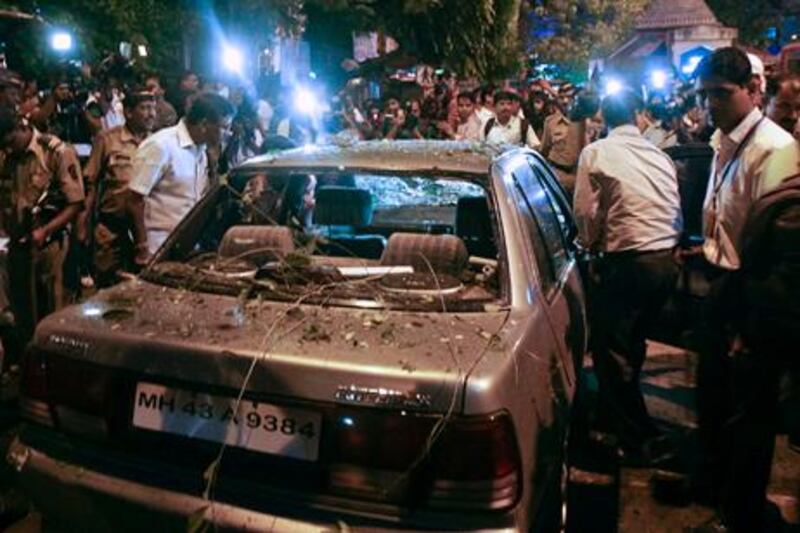MUMBAI // At least 21 people were killed and more than 140 injured yesterday in three almost simultaneous explosions in Mumbai.
It was the deadliest attack on India's financial capital since 2008, when 166 died during a 60-hour siege by an armed gang of 10 Islamist militants.
The first explosion yesterday struck the Jhaveri Bazaar at about 7pm local time, tearing through the famous jewellery market. A minute later, a second blast hit the busy business district of Opera House, several kilometres away. At 7.05pm, the third bomb exploded in the crowded central neighbourhood of Dadar.
In the aftermath, blood-covered bodies lay on the streets and people hugged and wept. Others carried the wounded to taxis. Crowds gathered in the blast areas as police questioned witnesses, and bomb squads inspected vehicles searching for clues and other explosives.
Motorcycles were charred, shopfronts shattered and a bus stop ripped apart. A photograph showed victims crowding into the back of a lorry to be taken to hospital.
The blasts were caused by improvised explosive devices planted in parked vehicles, police said.
"This was a coordinated attack by terrorists," Palaniappan Chidambaram, the home minister, said in New Delhi. "The entire city of Mumbai has been put on high alert. I would appeal to the people of Mumbai and people all over the country to remain calm and to maintain peace."
The Indian prime minister, Manmohan Singh, said: "I appeal to the people of Mumbai to remain calm and show a united face."
The UAE Minister of Foreign Affairs, Sheikh Abdullah bin Zayed, last night condemned "this horrible crime" and said the UAE stood side by side with India.
The US president, Barack Obama, also condemned the attacks and said his "thoughts and prayers are with the wounded and those who have lost loved ones".
Mr Obama said: "India is a close friend and partner of the United States. The American people will stand with the Indian people in times of trial, and we will offer support to India's efforts to bring the perpetrators of these terrible crimes to justice."
After the 2008 attack, security was beefed up in Mumbai and the city was transformed into a virtual fortress. Metal detectors, dog squads and gun-toting security personnel behind sandbags were a familiar sight at railway stations, airports, shopping malls, cinemas and hotels.
However, "the very fact that so many people are dead indicates that the local police and intelligence agencies still do not have the capacity to pre-empt such terrorist strikes", said Uday Bhaskar, a former director of the Institute for Defence Studies and Analyses in New Delhi.
The government said yesterday's explosions did not bear the signature of any specific militant group.
"We are not speculating about who could have done it, but this is an attack on the heart of India," said Prithviraj Chauhan, the chief minister of the state of Maharashtra.
"Whichever terrorist group is involved," Mr Bhaskar said, "definitely has the confidence and competence to carry out multiple attacks. A certain degree of local complicity is also suspected."
But it was too early to comment definitively on those likely to be responsible, he cautioned, and urged the government to refrain from knee-jerk "Pavlovian responses" of pointing fingers at Pakistan-based militant groups without corroborative evidence.
For years, relations between India and Pakistan have remained hostage to the threat of terrorism. The Indian government has repeatedly demanded that Pakistan dismantle its anti-India terrorist organisations, which have been accused of orchestrating several attacks on Indian cities.
The two governments had gone through four rounds of peace talks before the 2008 attack.
The fifth round was under way when the Mumbai attacks occurred.
The fragile peace process was stalled for years. After a two-year hiatus, foreign ministers of both countries are expected to meet this month in New Delhi for the latest round of peace talks.
The Pakistani government was quick to express solidarity with victims of yesterday's explosions.
"President Asif Ali Zardari, Prime Minister Yousuf Raza Gilani, the government and the people of Pakistan, have condemned the blasts in Mumbai and expressed distress on the loss of lives and injuries," Pakistan's foreign ministry said in a statement.
"They have expressed their deepest sympathies to the Indian leadership."
In December, authorities in Mumbai deployed extra police on city streets after receiving intelligence that a Pakistan-based militant group was planning an attack over the New Year weekend.
Police conducted house-to-house searches in some neighbourhoods for four men who authorities believe entered the city to carry out a terrorist attack, and computer-generated photographs of the men were released.
In March 2010, Mumbai police said they prevented a major terrorist strike after they arrested two Indian men who, police said, were preparing to hit several targets in the city. In September, police issued a terror alert for the city during a popular Hindu festival.
* With additional reporting from Associated Press and Agence France-Presse





